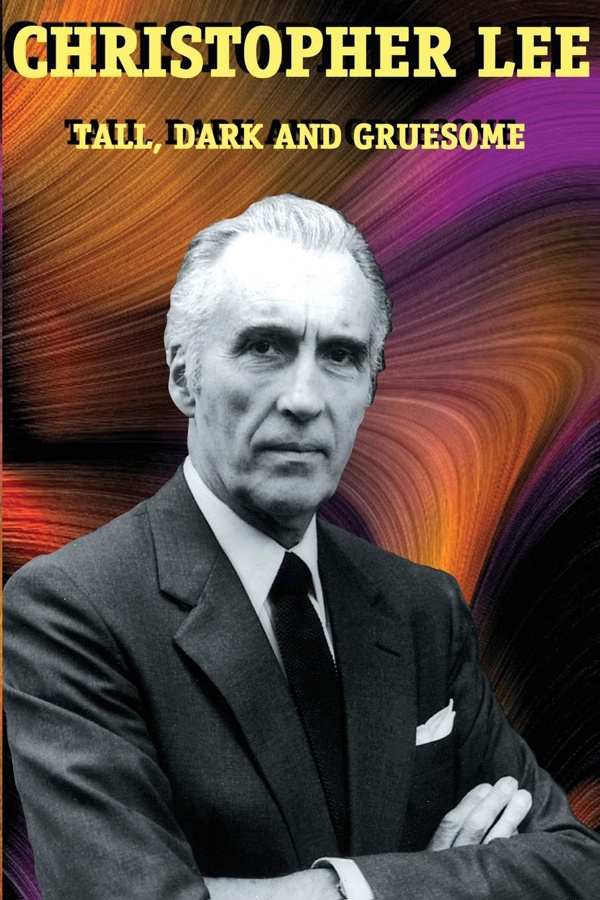Tall, Dark and Gruesome
 |
 |
 |
 |
 |

- Publication Date: August 1st, 1999
- Written by: Christopher Lee
- Page count: 320
When I was growing up, I mainly knew Christopher Lee from his roles in things such as The Lord of the Rings and the Star Wars prequels. His deep voice, piercing eyes and commanding presence made his portrayals of characters like Saruman and Count Dooku instantly memorable, and for a long time, they were the only roles that I associated him with. I knew he had a legacy as a well-respected actor and that he played Dracula several times, but when I was young, I didn't have any exposure to the older films that he was in. As an adult, after watching dozens of Hammer films and various European productions that he took part in, I count him as another one of my favorite actors. He may have helped to revitalize the classic monsters for a new generation with his roles as Frankenstein's monster, Dracula and the Mummy (his portrayal of the Count being my all-time favorite next to Bela Lugosi's), but his talents went well beyond the world of horror films. Thrillers, swashbucklers, epics, dramas - no matter what genre, his stature and presence left their mark on every film he was in. This was another book that my girlfriend bought me as a Christmas present, and knowing how long and varied his life and career were, I was very excited to hear this winding life story told in the man's own words.
From the very first paragraph, I could tell that this was going to be a pretty funny read:
"When a film is made, the first take is usually the best. I hope this applies to books too, because after discarding 17 bright descriptions of the way I made my very first entrance, on Saturday, May 27, 1922, I've decided to print the one I first thought of. I wish I could use the marvelous booming phrase that I heard from Orson Welles on the only occasion he ever directed me in a film, and 'print - with enthusiasm!' But the truth is that neither I nor this book would ever have come about if nature had paid any heed to the convenience of my parents. I was 'a mistake.' My mother often told me so."
Like Peter Cushing's autobiography, there is so much humor sprinkled all throughout this book. Lee writes in a way that you would expect from such a well-traveled and educated man, with some obscure vocabulary and phrases from other languages tossed in for good measure. A lot of the jokes are written in ways that feel very dry and casual, and if you don't know some of the context, quite a few of them will likely go over your head. The best autobiographies read like the person is sitting in front of you and having a casual conversation, and this book is a perfect example of that done right.
Compared to some actors' rags-to-riches stories, Lee's story is more like riches-to-rags then back to riches. A good chunk of the beginning of the book covers his family ancestry, detailing a lot of fascinating history before he even begins to talk about his childhood. One fact that I was unaware of was that his mother's family, the Carandinis, was a noble Italian family whose history goes back hundreds of years. In his words they were "soldiers and bishops and administrators", with numerous generations of influence lasting into the 1800s, with one family member being buried next to the painter Raphael. This long family history combined with his stepfather's connections via his banking job meant that Lee was surrounded by aristocrats and other wealthy people throughout his childhood. The family fortunes came crashing down when his stepfather lost a large amount of money and World War II broke out, but by that point, he had a substantial network of people that would be very valuable later in life when it came to jobs and opportunities. In fact, it was a wealthy Carandini cousin who suggested the idea of Lee becoming an actor out of the blue once the war was over. I like the fact that he was aware of the privilege he had in life, and he writes in a very gracious way about every person who gave him a helping hand, admitting that he would have been lost if it weren't for them. It's also very amusing to hear so many famous / wealthy / noble / historical people brought up as simply casual friends that he would speak to every day.
Being a movie guy, I was most interested in reading Lee's accounts of his long and varied film career. The second half of this book covers all of this in almost exhausting detail. He talks about dozens and dozens of films that he was in, mostly in chronological order, as well as the numerous places that he traveled to while making them. Several chapters of the book fall into a sort of pattern: go to a country, make a movie, tell a funny story or two, meet a new person, and repeat. Even though there are a lot of stories about the movies that he made with Hammer, there are even more stories about the various European films he was in as he traveled the continent. This part of his career tends to get overshadowed by his Hammer work, so getting to read some recollections on overlooked films such as The Castle of the Living Dead or Sherlock Holmes and the Deadly Necklaceis a great change of pace. It's also refreshing how honest he is with his reservations on being typecast and how much he longed to play non-villainous / horror roles. He always wanted the chance to play a hero, but because of his height and "dark" features, he always found himself cast as the villain, which he eventually developed a sense of humor about. Even though I love so many of the movies that he clearly didn't think too highly of (like The Satanic Rites of Dracula), I can't say I blame the man for wanting better quality in some of the productions he was in. I think my pick for the funniest way he dismissed a couple of his movies had to do with some Fu Manchu sequels: "Castle of Fu Manchu introduced me to golf in Barcelona, and some spectacular courses in Brazil fell to me with Fu Manchu and the Kiss of Death. Never was a picture so aptly named. It was the last."
Speaking of golf, if there is one criticism I could make about the book, it's that there's a little too much of it in here. Golf was one of Lee's favorite pastimes throughout his life, and there are entire chapters dedicated to games he played while traveling or tournaments he took part in when he wasn't working. If you like hearing someone talk about a hobby that they're clearly very passionate about, they can be fun to read. But I'm not a fan golf, so these chapters tended to drag on a little bit for me. The first couple of them were perfectly fine, but when the fourth or fifth one turned up, I found myself counting the pages until I could finally get to something else. One interesting bit is that these games often paired him with actors, directors, politicians or other influential people, so if you want even more information on Lee's ever-expanding network of connections, you may get some insights out of them.
When I started reading this book, a coworker of mine told me that if they ever made a biopic of Christopher Lee's life, it would have to be a trilogy. I think I have to agree with him. There is so much covered in this book that if I were to keep writing about every individual story that I liked, this page would go on forever. The only way to really get a grasp of how full of a life he lived is to sit down and read this book. He was a legend both on and off screen, and it's kind of crazy to think that one man experienced so much in one lifetime. If you want an account of a life truly lived to the fullest, this is definitely one to check out.



